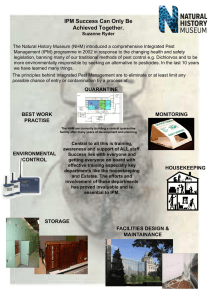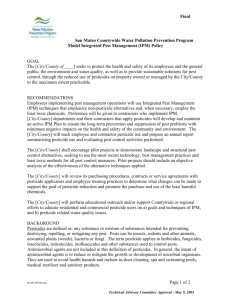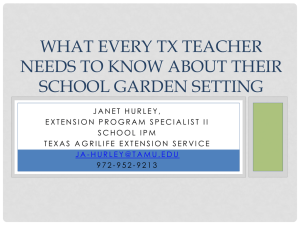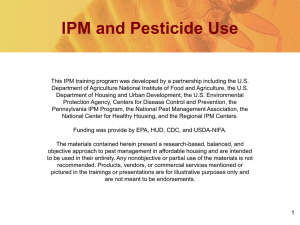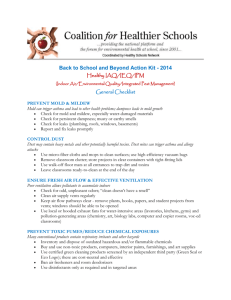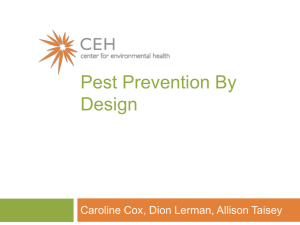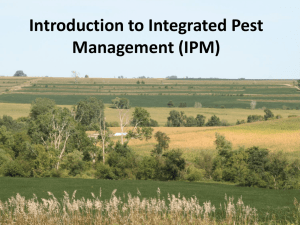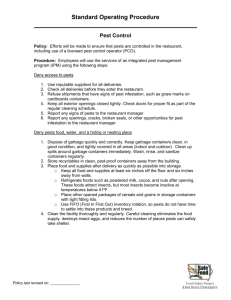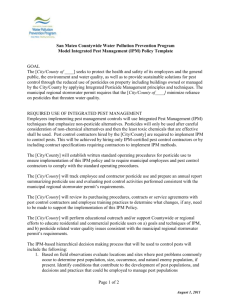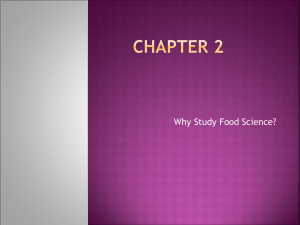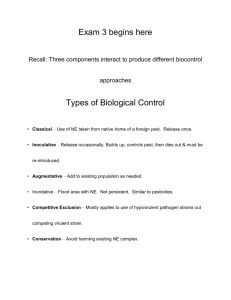Clients (26 slides, ppt)
advertisement
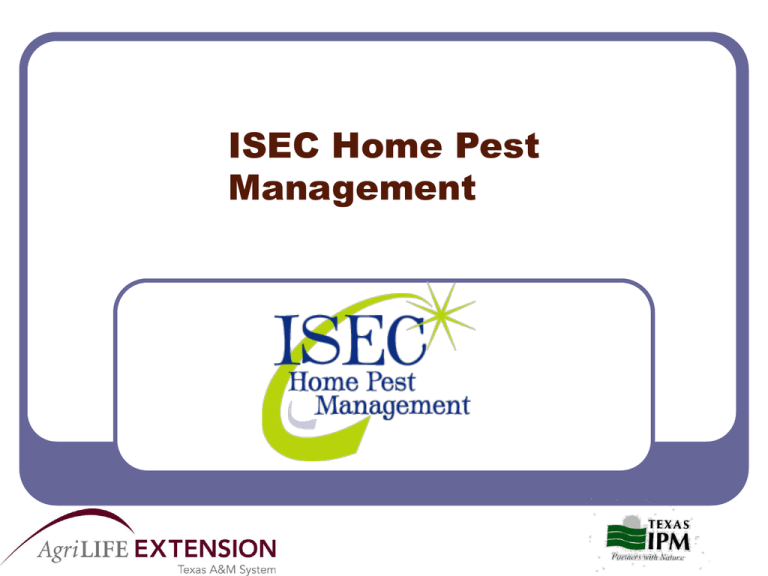
ISEC Home Pest Management What is ISEC? ISEC stands for the 4 steps in getting rid of pests in your home: • I is for Identify • S is for Sanitize • E is for Exclude • C is for Control What are ISEC’s Goals? Prevent most household pest problems without using pesticides Increase awareness of IPM Reduce exposure & risks of pesticides used in the home The Pest Triangle Water To avoid pest problems break the pest triangle Pest Problems Food Harborag e What’s This Thing Called IPM? IPM is code for Integrated Pest Management It’s a way of thinking and acting about pest problems- a strategy or plan that takes advantages of the weaknesses of the pest IPM is designed to prevent pest problems rather than to control them once they occur It uses methods that reduce risks to human health and the environment IPM uses pesticides only when necessary, then chooses those least-toxic Why Use IPM? Provides long term results Environmentally friendly Protects human health Reduces unnecessary pesticide use This Sounds to Good to Be TrueDoes IPM have any Downsides? Requires more knowledge & skill than reaching for a can of pesticide Requires attention to details Results not always immediate Let’s Check Out ISEC’s WeaponsThe Four Basic Concepts Identify Properly identify the pest Sanitize Remove what attracts pests Exclude Keep pests from entering the home Control Use non-chemical methods first, and least-toxic pesticides only when necessary Identify? Tell Me More Now that you have found a pest- what is it? It’s important to know. Even similar pests may require very different control methods So, if you don’t know, capture it and get help! Most insect specimens can be preserved in the freezer Preserve soft bodied insects in rubbing alcohol ISEC- Identify What if I can’t or don’t want to capture it? Collect sample of it’s damage, droppings or other evidence Take a photograph or digital image of the pest, damage or droppings ISEC- Identify What should I do with it now? • Use a field guide, book or bulletin to identify the pest yourself • Take the sample or e-mail the image to local Extension office, pest control company or nursery ISEC Weapon No. 2- Sanitize What Does That Mean? Eliminate food & water sources Keep food (including pet food) in pest-proof containers Tightly re-seal opened food packages Do not leave food out overnight Do not leave dirty dishes in the sink Clean kitchen counters, tables & floors often Clean up spilled food & drink immediately Tell Me More- Sanitize Encourage eating at the table Sweep & vacuum regularly Caulk cracks around pantry shelves so that food does not accumulate Inspect & discard any infested food products ISEC- Sanitize Take out garbage several times a week Use a closed container lined with a plastic bag Clean garbage can inside & out on a regular basis Rinse items for recycling before storing in a container with a tight lid Clean containers inside & out Keep recycling containers outside ISEC- Sanitize Eliminate pest breeding sites Clean drains with a stiff brush, flush with boiling water Do not allow debris to build up on grout of tile floors Do not allow old newspapers, magazines, plastic bags to accumulate Weapon #3- Exclude That Means Keep ‘em Out! Seal openings around pipes & electrical wiring with caulk, steel wool or foam If you can see daylight around doors, replace weather stripping or threshold Keep window and door screens in good repair Place screen wire over vents and other points where pests could enter ISEC- Exclude Store food items in air-tight containers • Do not buy damaged goods or infested products • Store dried food products in the refrigerator or freezer if leaving home for an extended time ISEC- Exclude Use garbage containers with closed lids Stuff weep holes with steel wool or copper mesh ISEC- Exclude Do not store firewood or other items against the home Prune vegetation that touches the home Inspect items that you bring into the home Feed outdoor pets away from entry doors And the Final Weapon- Control Non-chemical Trapping devices such as fly paper, mouse traps or roach prisons Use vacuum cleaner to help control pests such as fleas, moths or beetles and remove food sources ISEC- Control Chemical Try baits first- they are safe & effective Use gel formulations along cracks & crevices Insecticide sprays may be used in specific locations Cracks & crevices Along baseboards If You Have to Use the Big GunsDo it Safely! Buy only pesticides labeled for the pest and area you are treating Read & follow all label instructions, use only amount listed- more is not better Keep children & pets out of treated area until the product is dry Never apply pesticides to food Wash hands with soap and water Pesticide Signal Words“The Code Words” Caution Warning Least harmful to humans, handle carefully More dangerous than “caution” labeled products Danger Very dangerous and/ or irritating; use with extreme care Pesticide Storage & Disposal Store pesticides only in original container where children and pets cannot get to them Follow disposal procedures on the label Never reuse a pesticide container Never, never pour a pesticide down a drain or toilet! Still Have Problems? Better Hire an IPM Professional! Here’s How You’ll Know Must be licensed- ask to see state license and check references Does the person and equipment appear professional? Does the person know about IPM? Get several quotes, lowest price is not always most economical

